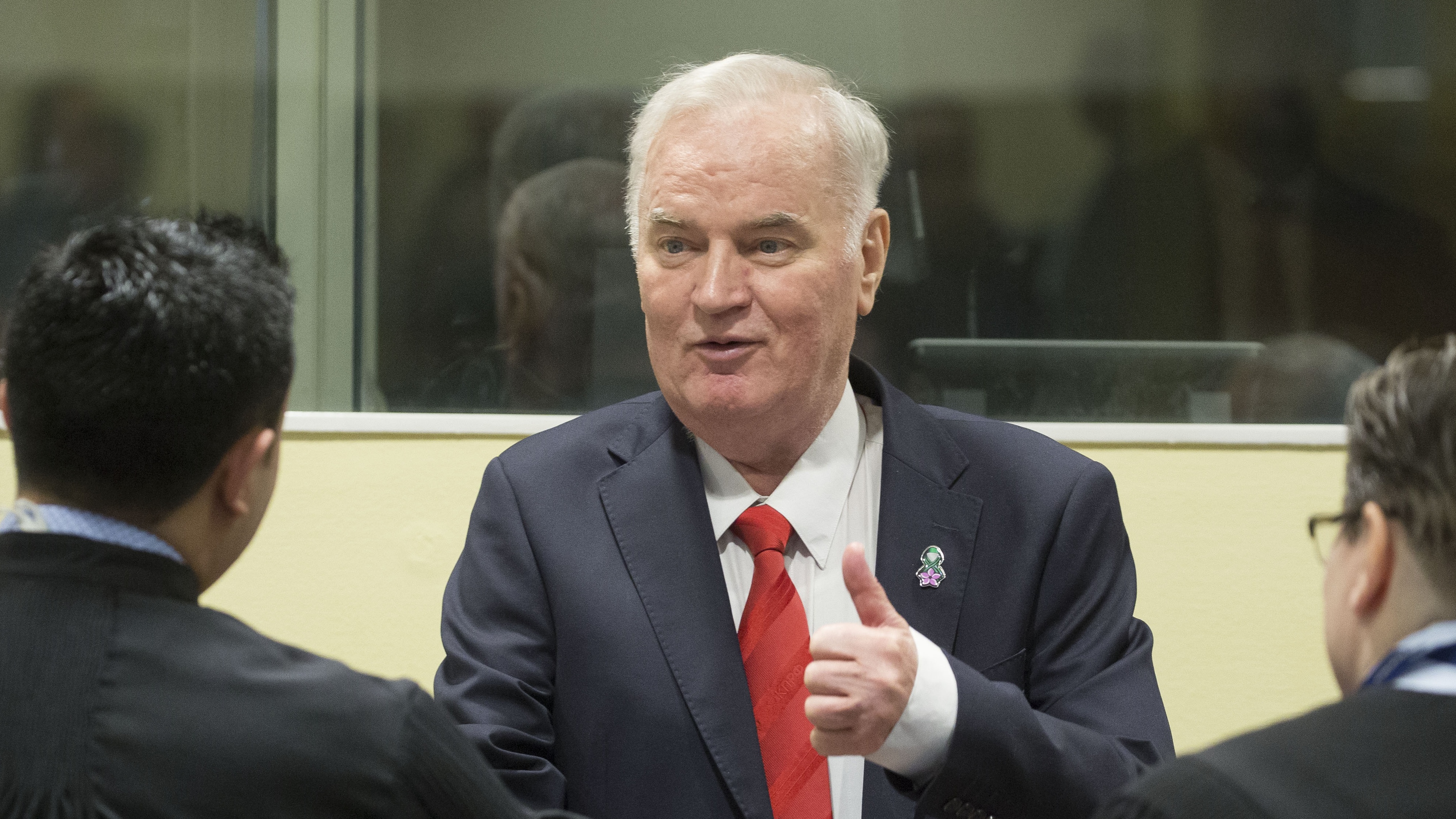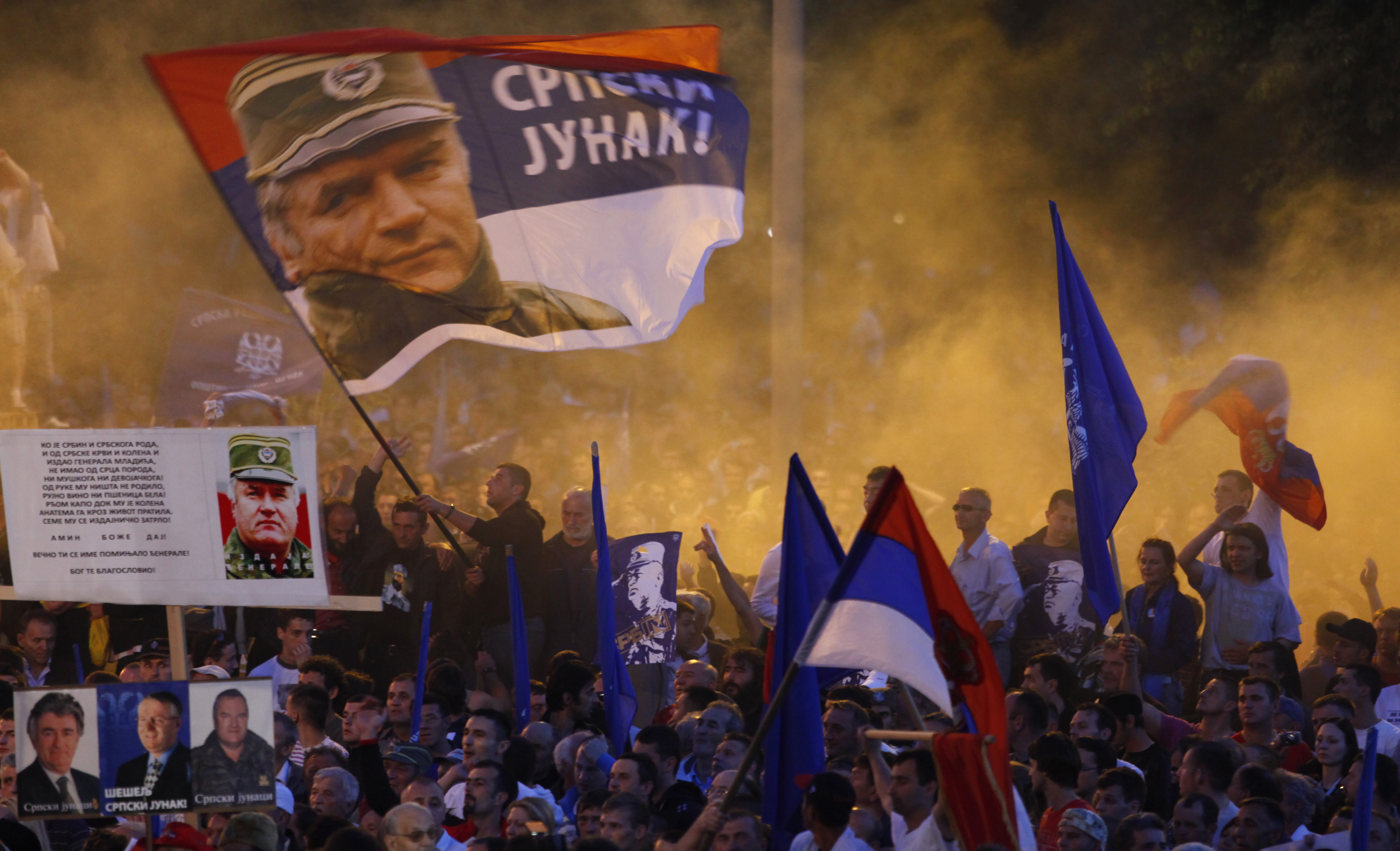‘Butcher of Bosnia’: why war criminal Ratko Mladic has hero status among some in the Balkans
Mothers of Srebrenica hail ‘historic day’ as ex-Bosnian Serb commander sentenced to life in jail

A free daily email with the biggest news stories of the day – and the best features from TheWeek.com
You are now subscribed
Your newsletter sign-up was successful
UN judges have sentenced Ratko Mladic, the former Bosnian Serb military commander known as the “Butcher of Bosnia”, to life in prison for war crimes and genocide in a final judgment without appeal.
In 2017 Mladic, who led the Bosnian Serb army during the Bosnian War, was convicted on multiple charges of extermination, murder, deportation, forcible transfers, terror, hostage taking and attacks on civilians.
However, his most infamous crime was the murder - under his orders - of 8,000 Bosnian Muslim men and boys at Srebrenica in 1995, the first act of genocide on European soil since the Holocaust during the Second World War.
The Week
Escape your echo chamber. Get the facts behind the news, plus analysis from multiple perspectives.

Sign up for The Week's Free Newsletters
From our morning news briefing to a weekly Good News Newsletter, get the best of The Week delivered directly to your inbox.
From our morning news briefing to a weekly Good News Newsletter, get the best of The Week delivered directly to your inbox.
Widows and mothers of his Srebrenica victims attended the hearing yesterday. “Today is a historic day for us mothers. Today, finally, the judgment for the greatest butcher of the Balkans,” said Munira Subasic, leader of the Mothers of Srebrenica group.
Divided nation
“Wearing a black suit and a sky blue tie, Mladic scowled, sat back in his chair and rested his chin on his hand” as the confirmation that he will die behind bars was read out by the presiding judge, The Guardian reports.
Mladic’s only words were to respond “yes, I can” when asked whether he was able to follow the proceedings, a marked contrast to his 2017 sentencing when he shouted “this is all lies” and “I’ll fuck your mother”, while gesticulating at the relatives of his victims.
A free daily email with the biggest news stories of the day – and the best features from TheWeek.com
The only person in the court not wearing a mask, he listened to the rejection of each of his appeals in silence before being led away.
“Diametrically opposing views” of Mladic’s legacy “reflect deep ethnic divisions that still exist in Bosnia” almost three decades after the brutal civil war, Euronews says.
For Bosniaks, the mainly Muslim targets of his wartime ethnic cleansing campaign, “he is a villain and war criminal” known as the “Butcher of Bosnia”, the broadcaster adds, while Bosnian Serbs still “worship their wartime commander as a martyr and hero”.
Captured in 2011 after almost a decade on the run from UN prosecutors, Mladic is considered by many Bosnian Serbs to have been a “defender of the nation”, Reuters reports, with his home village naming a street in his honour following the 1992 to 1995 war.

Serbia also still “refuses to recognise” the Srebrenica massacre as genocide, The Times says, while senior figures, including Prime Minister Ana Brnabic, “regularly deny” that the mass murder of 8,000 Muslim men and boys took place.
Milorad Dodik, the leader of Republika Srpska (the Serb enclave in Bosnia), a few days ago said the genocide “did not happen”, while Serbian Defence Minister Aleksandar Vulin “has appointed convicted war criminals to teach in the military academy”, the paper adds.
Hopes are high that the sentencing will “bring closure for the victims’ families and drive home the message that there is no impunity for war crimes”, Euronews says. But some Bosnian Serbs have already rejected the court’s findings, with veteran Milije Radovic describing Mladic as “an icon” and telling the broadcaster he “cannot accept any verdict”.
“Nobody can convict him of anything, especially not The Hague tribunal,” Radovic said. “He is one of us. He is the victim of an international conspiracy by mafioso politicians. He is our man, a man from here, who respected the rules of war.”
Culture of denial
Serge Brammertz, a former UN prosecutor, this week cautioned that “nationalist politicians across the former Yugoslavia” are “trying to erase from history” acts of genocide committed during the 1990s, The Times reports.
“Glorification and denial of genocide are very much stronger than five or ten years ago - and I have been in this job for 13 years,” Brammertz said, adding that “the underlying attitudes are still present with many politicians and will be over many years to come”.
“Today they are not ashamed any more to put out their lies publicly. There is a populist trend to distract attention from all the other problems in their societies. Many politicians are still today trying to use ethnic hatred to justify their existence.”
Brammertz cited a special commission formed by the administration in Republika Srpska to establish the “truth” about the massacre at Srebrenica and the siege of Sarajevo.
“As expected they concluded that there was no genocide in Srebrenica and no terrorising of the civilian population in Sarajevo, obviously ignoring all evidence and findings,” he said. “There is a new phase, even worse than genocide denial, to try to create a new historical reality.”
Describing Mladic as “the most important war criminal convicted of crimes committed in the middle of Europe in the 1990s”, Brammertz continued that his conviction will “make people think a little bit more about the wrongdoing during the war and what it really meant”.
However, even after Mladic’s life sentence, many Bosnian Serbs will continue to celebrate his legacy.
“If the law is to be respected, he should be set free to return home,” Darko Mladic, his son, told Euronews. “I never doubted him because I know him so well, I know his character.”